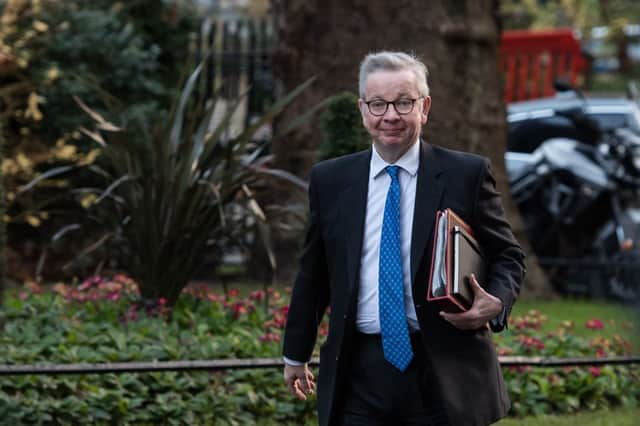Christmas bubbles expected to go ahead - but the four nations may take differing approaches


The government is expected to go ahead with the relaxation of Covid restrictions over the Christmas period, despite warnings it will lead to a rise in infection rates.
Michael Gove held a meeting with the leaders of the devolved administrations on Tuesday (15 December) evening amid concerns that rules should be made stricter.
Advertisement
Hide AdAdvertisement
Hide Ad‘Personal judgement’
Communities Secretary Robert Jenrick has said that it will be up to people to make a “personal judgement” on who they want to see over the five days, and whether they should meet up with vulnerable family members.
Mr Jenrick suggested that some people may decide to “keep it small” and put off larger gatherings until the spring, stating that “Easter can be the new Christmas”.
He said: “Our position is clear that the legal framework will continue but because the infection is rising in many parts of the country, because we can see these international examples like Thanksgiving, it is incumbent on each every family across the country this morning and in the days ahead to have that conversation round the breakfast table, ‘Is this right for our family?’
“This is a virus that thrives on social interaction so bringing more people together, even over this short period of time, is not cost-free.
Advertisement
Hide AdAdvertisement
Hide Ad“It will have consequences in terms of increasing the rate. It will rise.”
Talks ongoing
Cabinet Office minister Michael Gove is resuming talks over the plans to allow up to three households to mix between 23 and 27 December with leaders of the devolved administrations.
However, a UK government source has suggested that the four UK nations may choose to take differing approaches, although there would be no change in the law in England.
Scientists have warned that the decision to press ahead with relaxing the rules could “cost many lives”.
Advertisement
Hide AdAdvertisement
Hide AdBoth the Health Service Journal and British Medical Journal described lifting the restrictions as “rash,” and say the public may see the easing of measures as “permission to drop their guard.”
Labour leader Sir Keir has urged Prime Minister Boris Johnson to call an emergency meeting of the government’s top level Cobra committee to review the situation, saying the tier system introduced two weeks ago has failed to control transmission.
With infection rates continuing to rise across the country, particularly in the South of England, calls to review the relaxed plans for Christmas have been raised.
Sir Keir said: “I understand that people want to spend time with their families after this awful year, but the situation has clearly taken a turn for the worse since the decision about Christmas was taken. It serves no-one for politicians to ignore this fact.
Advertisement
Hide AdAdvertisement
Hide Ad“It is my view that you should now convene Cobra in the next 24 hours to review whether the current relaxation is appropriate given the rising number of cases. If you conclude with government scientists that we need to take tougher action to keep people safe over Christmas, then you will have my support.”
However, Wales’ First Minister Mark Drakeford has said that he will “not lightly put aside” the “hard-won” four nations agreement over household mixing at Christmas.
Mr Drakeford said he has already received pleas from people not to reverse the agreement that is in place for Christmas, adding that for many, particularly those who live alone, the festive arrangements have been the only thing they have been able to look forward to in recent weeks.
He added that having a “rule-based approach to Christmas” with modestly increased amounts of freedom for people is “preferable than a free-for-all,” and said he would discuss with Mr Gove whether the current agreement continues to have marginally more advantages than disadvantages.
Advertisement
Hide AdAdvertisement
Hide AdMeanwhile, Scottish First Minister Nicola Sturgeon has urged “the utmost caution” in meeting over Christmas, and said if people can avoid mixing with other households, especially indoors, then they should do so.
However, she added: “If you feel it essential to do so - and we have tried to be pragmatic in recognising that some people will - then please reduce your unnecessary contacts as much as possible between now and then.”